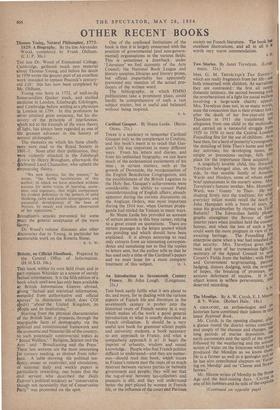OTHER RECENT BOOKS
Thomas 'Voting, Natural Philosopher, 1773- 1829: A Biography. By the late Alexander Wood, completed by Frank Oldham. (C.U.P. 30s.) THE late Dr. Wood of Emmanuel College, Cambridge, gathered much new material about Thomas Young, and before his death in 1950 wrote the greater part of an excellent work intended to replace Peacock's century- old Life: this has now been completed by Mr. Oldham.
Young was born in 1773, of well-to-dq Somersetshire Quaker stock, and studied medicine in London, Edinburgh, Gottingen, and Cambridge before settling as a physician ip London in 1799. In this profession he never attained great eminence, but his dis- covery of the principle of interference, nhich led to the triumph of the wave theory of light, has always been regarded as one of the greatest advances in the history of natural philosophy. .
The memoirs on which his fame chiefly rests were read to the Royal Society in 1801-3. Soon after their publication, they Were violently attacked in the Edinburgh 8eview by Henry Brougham, afterwards the erplebrated Lord Chancellor, who upheld the eorpusculaf, theory.
"We now dismiss, for the present," he wrote, "the feeble lucubrations of this author, in which we have searched without success for some 'traces of learning, acute- ness, and ingenuity, that might compensate his evident deficiency in the powers of solid thinking, calm and patient investigation, and successful development of the laws of Nature, by steady and modest observation of her operations."
Brougham's articles prevented for some years the general acceptance of the wave theory.
Dr. Wood's volume discusses also other discoveries due to Young, in particular his memorable work on the Rosetta Stone.


































































 Previous page
Previous page